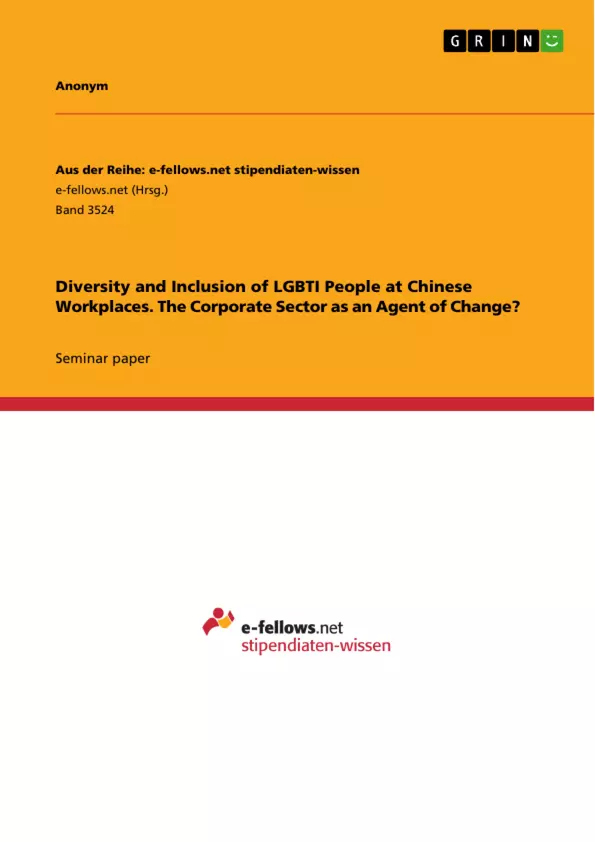This term paper is about the current situation of LGBTI employees in China and the way companies deal with the LGBTI issue. This paper mainly focuses on the triangle of businesses, their employees and the market itself, dealing with non-governmental organizations (NGO) and the lawmaker only marginally.
The research question is whether the corporate sector can act as an agent of change, a promoter and driving force of LGBTI rights in China. This question shall be answered by analyzing several empirical surveys dealing with LGBTI peoples’ perceptions of their workplace experience.
It is estimated that around 70 million LGBTI (Lesbian, Gay, Bisexual and Transgender and Intersex) are living in the People’s Republic of China (PRC). Of those only 5% are estimated to live openly. The workplace is the last place where Chinese LGBTI people disclose their SOGIE (Sexual Orientation and Gender Identity and Expression). On the other hand, the workplace is also among the daily life environments with the lowest rate of discrimination contrasting high rates of discrimination at the family and the school.
Inhaltsverzeichnis (Table of Contents)
- Introduction
- Legal framework of LGBTI life in China
- International norms
- International norms targeting workspace
- National law
- National law targeting workspace
- Chinese LGBTI perceptions of corporate culture
- Access to education, vocational training and guidance
- Access to employment
- Conditions of work
- Equal remuneration for work of equal value, career development and security of tenure
- The economic dimension of ex- and inclusion of LGBTI employees
- The price of exclusion
- The benefits of inclusion
- Conclusion
Zielsetzung und Themenschwerpunkte (Objectives and Key Themes)
This term paper examines the current situation of LGBTI employees in China and the way companies deal with the LGBTI issue. The research question explores whether the corporate sector can act as an agent of change, promoting and driving LGBTI rights in China. The paper analyzes empirical surveys to assess LGBTI perceptions of their workplace experiences. Although data is relatively new and specific to China, the paper occasionally refers to data from other countries and regions. The author acknowledges potential limitations in comparing data from different locations, but assumes that fundamental tendencies observed in the findings are universally applicable.
- The legal framework governing LGBTI life in China, both domestically and internationally, including its impact on the workplace.
- The experiences of LGBTI employees in China, as reflected in recent surveys and data.
- The economic implications of excluding or including LGBTI workers for Chinese businesses.
- The potential role of the corporate sector as an agent of change in promoting LGBTI rights in China.
Zusammenfassung der Kapitel (Chapter Summaries)
- Chapter Two: "Legal framework of LGBTI life in China" examines international norms affecting LGBTI life in general and at workplaces specifically. It also explores national law on LGBTI life and recent trials related to these issues.
- Chapter Three: "Chinese LGBTI perceptions of corporate culture" analyzes findings from recent surveys concerning the working experiences of LGBTI employees in China. This analysis follows the approach of the United Nations Development Programme (UNDP) and the International Labour Organization (ILO), recognizing that LGBTI individuals face discrimination throughout the entire employment cycle.
- Chapter Four: "The economic dimension of ex- and inclusion of LGBTI employees" explores Chinese businesses as actors in dealing with LGBTI issues and potential cost and benefits associated with their conduct.
Schlüsselwörter (Keywords)
The main keywords and focus topics of this paper include LGBTI rights, corporate social responsibility, workplace discrimination, inclusivity, diversity, economic impact, Chinese law, international norms, and the role of business in promoting social change.
Frequently Asked Questions
What is the situation of LGBTI employees in China?
It is estimated that only 5% of the 70 million LGBTI people in China live openly, with the workplace being the place where they are least likely to disclose their identity.
Can Chinese companies act as agents of change?
The paper explores whether the corporate sector can drive LGBTI rights by promoting inclusivity and diversity independently of the lawmaker.
Is there workplace discrimination against LGBTI people in China?
While the workplace often has lower rates of discrimination compared to family or school environments, LGBTI individuals still face challenges throughout the employment cycle.
What is the economic dimension of LGBTI inclusion?
The paper analyzes the "price of exclusion" and the potential benefits for companies that foster an inclusive environment for LGBTI staff.
What legal framework applies to LGBTI rights in China?
The study examines international norms as well as national Chinese laws regarding employment and their impact on LGBTI workers.
- Quote paper
- Anonym (Author), 2019, Diversity and Inclusion of LGBTI People at Chinese Workplaces. The Corporate Sector as an Agent of Change?, Munich, GRIN Verlag, https://www.hausarbeiten.de/document/919403


